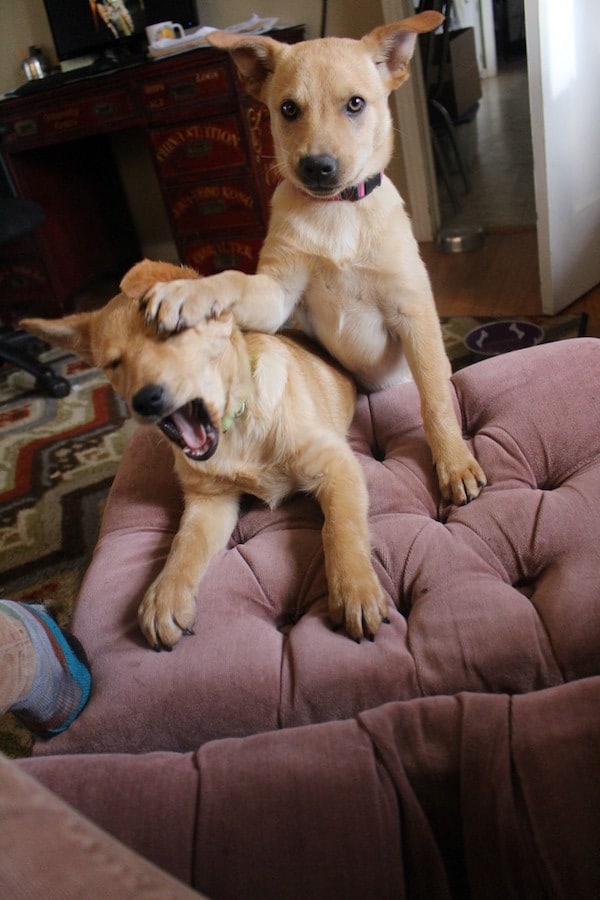2016 was the year of the puppies for us. Normally, we foster dogs of all ages, but we’ve realized that, for safety reasons, we need to only foster puppies or small-breed dogs during the goat kidding season at our farm — roughly January to May. Last year, we just ran puppies all year ‘round, mostly because we encountered so many pups who needed foster homes. As a general rule, when we foster young puppies, we take a pair. It seems to work best that way for us.
Most of the times that puppies pop up on our radar, it is an entire litter. That’s usually somewhere between three and a dozen. We almost always draw the line at two. We have done three before, but find that for some mystical reason, the difficulty of coordinating feeding and potty training escalates exponentially after two. Further, one of your most important tasks as a foster is to properly socialize all of the animals in your care, and I find it gets harder to work enough with each puppy if we have more than two. This may not be the case in your home. If you can take and properly socialize more than two, by all means do it!

Two of our 2016 foster pups, Sydney and Sassy. (Photo by Lisa Seger)
We also almost never take just one. Unless there is literally just one in need. And we’ve got several reasons for this. The first is that moving to a new environment and away from mom or other siblings is hard enough. When they come entirely on their own, that adjustment seems even harder. I would say 75 percent of our puppies cry the first night they are here and are left to go to sleep in a new, strange place, without the family they are used to. That number goes to 100 percent with a single puppy.
Our solo guy last year was Keyser Soze. He cried so much it almost made me cry, and he would not be fooled by the big “surrogate mama” stuffed animal we use to give new puppies comfort. He also didn’t get better with the crate moved into our bedroom. And so he slept in the bed with us for the first few nights. Which was nice for me, but not a great habit to instill in a puppy who might end up in a home where that is not OK. Luckily, like all puppies do, he found his stride in a few days and then happily went to his own dog bed after that.
Keyser Soze and our very patient resident dog Mama D. (Photo by Lisa Seger)
Once the adjustment to sleeping arrangements is made, we find that having a sibling also helps them occupy each other and satiate the puppy drive for play. Our own two dogs will eventually play with a solo puppy, but every foster term starts with them showing puppies proper pack behavior. Often that means pups get their feelings hurt while being disciplined, and so the play doesn’t happen until they have learned some of the ground rules. With a sibling, they can do both things at once. Plus, the older our own dogs get, the less they really even feel like wrestling with puppies. I think that play is an important part of learning how to be a dog, so getting a pair ensures that.
Lastly, I am just one of those people who thinks two dogs isn’t all that much harder than one. If you’re feeding one and taking one puppy out after every meal and every sleep anyway, why not just do it for two? Yes, initially it is twice the accidents to clean. Yes, it might mean twice the cords/shoes/remote controls chewed up, but all of those things are temporary. Hopefully, by the time they are ready for adoption the world has two more dogs ready to be good citizens in forever homes. And that is the ultimate goal.
Foster puppies Becky and Bey (now Sascha and Beignet). (Photo by Lisa Seger)
Did I mention two good citizens in two forever homes? Because that is a non-negotiable for us. While puppies thrive together when young, that is often not the case as they grow older. We never place siblings in a single home. But I’ll take that up in my next article.
The post Why We (Almost) Always Foster Two Puppies at a Time appeared first on Dogster.
No comments:
Post a Comment